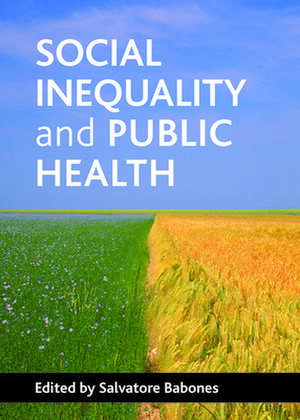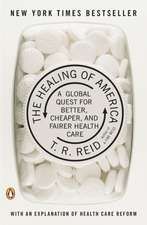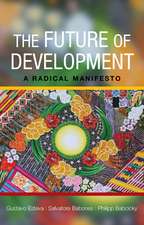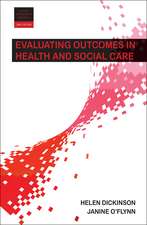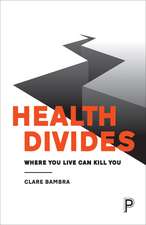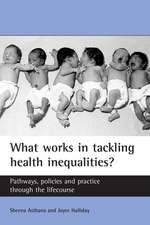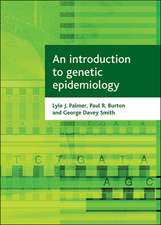Social inequality and public health
Autor Salvatore J. Babonesen Limba Engleză Paperback – 21 apr 2009
Public health in the early 21st century increasingly considers how social inequalities impact on individual health, moving away from the focus on how disease relates to the individual person. This 'new public health' identifies how social, economic and political factors affect the level and distribution of individual health, through their effects on individual behaviours, the social groups people belong to, the character of relationships to others and the characteristics of the societies in which people live. The rising social inequalities that can be seen in nearly every country in the world today present not just a moral danger, but a mortal danger as well. "Social inequality and public health" brings together the latest research findings from some of the most respected medical and social scientists in the world. It surveys four pathways to understanding the social determinants of health: differences in individual health behaviours; group advantage and disadvantage; psychosocial factors in individual health; and healthy and unhealthy societies, shedding light on the costs and consequences of today's high-inequality social models. This exciting book brings together leaders in the field discussing their latest research and is a must-read for anyone interested in public health and social inequalities internationally.
Preț: 339.82 lei
Nou
Puncte Express: 510
Preț estimativ în valută:
65.02€ • 67.89$ • 53.82£
65.02€ • 67.89$ • 53.82£
Carte disponibilă
Livrare economică 15-29 martie
Preluare comenzi: 021 569.72.76
Specificații
ISBN-13: 9781847423207
ISBN-10: 1847423205
Pagini: 256
Dimensiuni: 172 x 240 x 14 mm
Greutate: 0.45 kg
Editura: Bristol University Press
Locul publicării:United Kingdom
ISBN-10: 1847423205
Pagini: 256
Dimensiuni: 172 x 240 x 14 mm
Greutate: 0.45 kg
Editura: Bristol University Press
Locul publicării:United Kingdom
Recenzii
An exciting and wide ranging review of the new public health. This collection provides an efficient and intriguing introduction into what we now think most makes us healthy or ill. Daniel Dorling, Department of Geography, University of Sheffield
This book will form a very useful addition to the sparse canon of literature exploring the relationship between social inequality and health. Journal of Public Health
... a fascinating collection of issues in modern public health research, policy and practice. Sociology of Health & Illness
Notă biografică
Salvatore J. Babones is a lecturer in the Department of Sociology and Social Policy at The University of Sydney. His work has appeared in the "Journal of Sociology, Social Science & Medicine", and the "Handbook of Social Problems". His most recent book is "Global Social Change: Historical and Comparative Perspectives" (2006), co-edited with Christopher Chase-Dunn. Salvatore Babones received his Ph.D. from The Johns Hopkins University in 2003.
Cuprins
List of figures, tables, maps and boxes
Preface
Notes on contributors
1. Introduction
Salvatore J. Babones
Pathway 1: Differences in individual health behaviours
2. The role of time preference and perspective in socioeconomic inequalities in health-related behaviours
Jean Adams
3. Examination of the built environment and prevalence of obesity: neighbourhood characteristics, food purchasing venues, green space and distribution of Body Mass Index
Tamara Dubowitz, Theresa L. Osypuk and Kristen Kurland
4. Reinventing healthy and sustainable communities: reconnecting public health and urban planning
Mary E. Northridge, Elliott D. Sclar, Annie Feighery, Maryann Z. Fiebach and Emily Karpel Kurtz
Pathway 2: Group advantage and disadvantage
5. How and why do interventions that increase health overall widen inequalities within populations?
Martin White, Jean Adams and Peter Heywood
6. The metaphor of the miner’s canary and black–white disparities in health: a review of intergenerational socioeconomic factors and perinatal outcomes
Debbie Barrington
7. From adversary to ally: the evolution of non-governmental organisations in the context of health reform in Santiago and Montevideo
Javier Pereira Bruno and Ronald Angel
Pathway 3: Psychosocial factors in individual health
8. Health inequalities and the role of psychosocial work factors: the Whitehall II Study
Eric Brunner
9. Inequality, psychosocial health and societal health: a model of inter-group conflict
Siddharth Chandra
10. The social epidemiology of population health during the time of transition from communism in Central and Eastern Europe
Arjumand Siddiqi, Martin Bobak and Clyde Hertzman
Pathway 4: Healthy and unhealthy societies
11. The impact of inequality: empirical evidence
Richard Wilkinson
12. ‘Public goods,’ metropolitan inequality and population health in comparative perspective: policy and theory
James R. Dunn and Nancy A. Ross
13. Inequality and health: models for moving from science to policy
Salvatore J. Babones
Conclusions: Public understanding of the new public health
14. Promoting public understanding of population health
Stephen Bezruchka
15. Health, inequalities and mobilisation: human rights and the Millennium Development Goals
Paul Nelson
16. What the public needs to know about social inequality and public health
Salvatore J. Babones
Index
Preface
Notes on contributors
1. Introduction
Salvatore J. Babones
Pathway 1: Differences in individual health behaviours
2. The role of time preference and perspective in socioeconomic inequalities in health-related behaviours
Jean Adams
3. Examination of the built environment and prevalence of obesity: neighbourhood characteristics, food purchasing venues, green space and distribution of Body Mass Index
Tamara Dubowitz, Theresa L. Osypuk and Kristen Kurland
4. Reinventing healthy and sustainable communities: reconnecting public health and urban planning
Mary E. Northridge, Elliott D. Sclar, Annie Feighery, Maryann Z. Fiebach and Emily Karpel Kurtz
Pathway 2: Group advantage and disadvantage
5. How and why do interventions that increase health overall widen inequalities within populations?
Martin White, Jean Adams and Peter Heywood
6. The metaphor of the miner’s canary and black–white disparities in health: a review of intergenerational socioeconomic factors and perinatal outcomes
Debbie Barrington
7. From adversary to ally: the evolution of non-governmental organisations in the context of health reform in Santiago and Montevideo
Javier Pereira Bruno and Ronald Angel
Pathway 3: Psychosocial factors in individual health
8. Health inequalities and the role of psychosocial work factors: the Whitehall II Study
Eric Brunner
9. Inequality, psychosocial health and societal health: a model of inter-group conflict
Siddharth Chandra
10. The social epidemiology of population health during the time of transition from communism in Central and Eastern Europe
Arjumand Siddiqi, Martin Bobak and Clyde Hertzman
Pathway 4: Healthy and unhealthy societies
11. The impact of inequality: empirical evidence
Richard Wilkinson
12. ‘Public goods,’ metropolitan inequality and population health in comparative perspective: policy and theory
James R. Dunn and Nancy A. Ross
13. Inequality and health: models for moving from science to policy
Salvatore J. Babones
Conclusions: Public understanding of the new public health
14. Promoting public understanding of population health
Stephen Bezruchka
15. Health, inequalities and mobilisation: human rights and the Millennium Development Goals
Paul Nelson
16. What the public needs to know about social inequality and public health
Salvatore J. Babones
Index
